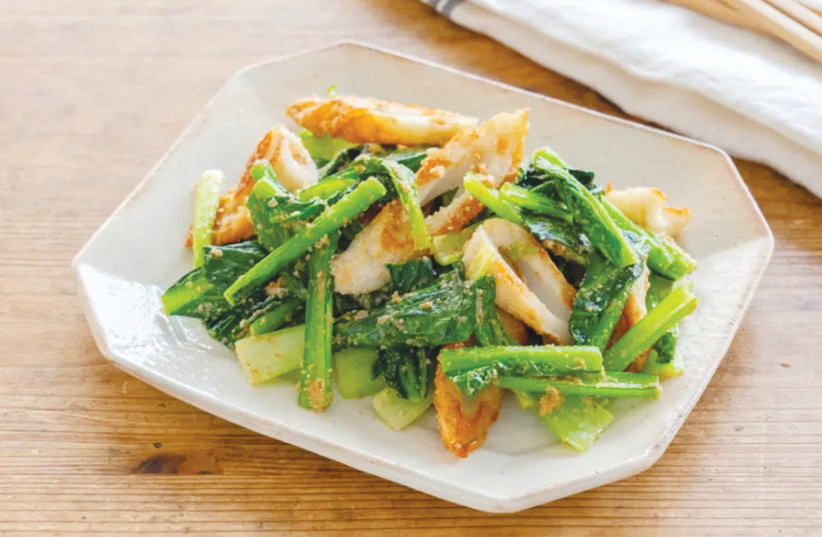Dressed in chef’s whites, Chef Masato Maesawa bent over the dish of shiitake mushrooms stuffed with grilled chicken and lotus root, and used tweezers to painstakingly add sprigs of dill to the dish. Watching this 69-year-old chef cook was a pleasure, his movements economical as he cooked six dishes almost simultaneously.
Chef Masato was in Israel for a brief visit sponsored by the Takemoto Oil and Fat Company, which specializes in sesame oil; and Yama V’Kedma, an Israeli company that imports kosher Japanese ingredients to Israel.
The chef is a representative of a unique cooking style called the Aichi Kitchen, which uses ingredients based on fermenting, including miso, soy sauce and mirin. He taught a master class at the Dan Gourmet cooking school, attended by about 20 chefs, restaurant owners, and a few members of the public.
What did Chef Masato Maesawa teach in Israel?
The atmosphere was festive and became more so as the participants tried six types of sake, which we used both to cleanse our palates between dishes, and to accompany the food. As some of you know, I am a “budding oenophile” and sake is rice wine, so there was a lot to learn. I was surprised to find out that most sake is only 14-16% alcohol, not much more than wine.
Chef Masato started by making dashi, a broth used in many Japanese dishes. It is usually made with dried bonito flakes, a type of tuna, but Yama V’Kedma has had trouble importing this ingredient as it has a special type of mold, so the dashi was made with shiitake mushrooms. Dashi is meant to add an umami flavor to the dish.

The mushroom with grilled chicken and lotus root was delicious. The lotus root, which I had never tried before, was glazed with soy sauce and mirin. This being Israel, everyone stuck their spoon into the dashi to taste it. Although I’m not a germaphobe, I suggested we use serving spoons from then on.
The next course may have been my favorite of the night – a carpaccio of grouper served with sesame oil and salmon roe. The fish was precisely sliced and the clean flavor went well with the sesame oil and the salmon roe. I learned that there are different kinds of sesame oil with different levels of toasting. Takeyuki Ito, from Takemoto Oil and Fat, who came with the chef from Japan, said that sesame oil is healthier than butter for frying. He relayed there is a tempura restaurant in Japan that uses only sesame oil for frying.
Next was a dish of fish tempura, but since I was chatting with some of my new friends at the workshop, I missed that one. Oh well, there was more to come.
We then moved on to a dish of mushrooms, chicken and rice that was cooked in a rice cooker. The flavors integrated beautifully and if I had more than one rice cooker, I would consider using one for meat.
We then did an experiment in which we tasted vegetables fried in canola oil, and then in sesame oil. I couldn’t really taste the difference, but those with a more sophisticated palate perhaps could.
In Japan, they don’t usually serve dessert, except perhaps for mochi, so I made do with yuzu-flavored sake that tasted a lot like limoncello.
Chef Masato also cooked dinner at the Dan Caesarea Resort along with the hotel’s chef Ophir Dvir. There were about 160 guests who paid NIS 380 each for an extensive Japanese meal that included eight appetizers – from a mushroom and miso consommé with goose and ginger dumplings, to a fish sashimi with yuzu, blood oranges and celery. The main course included goose osso buco with white miso, broccoli and snow peas and lamb breast in a Japanese barbecue sauce.
Although I didn’t attend the dinner, it seems that there were so many choices that it would have been impossible to try everything. I suggest that the Dan Hotel chain invite Chef Masato back next year!
The writer was a guest of the Dan Gourmet cooking school.
